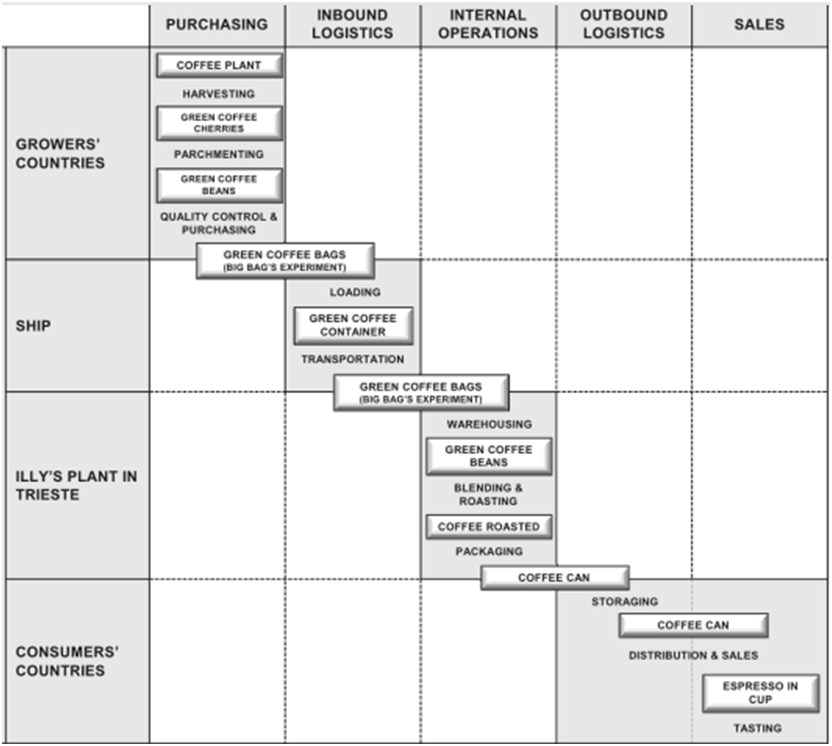Illy Supply-Chain Management: literature review
Illy is a global coffee brand that is sold in 140 countries and employs more than 800 people globally (Illy: By the Numbers, 2013).
The main difference between traditional logistics and supply chain has been drawn by Agrawal and Smith (2009) in a way that supply chain is a much broader concept than logistics and it focuses on the quality of relationships between various elements within the supply chain with the aims of achieving improvements
Elements of supply-chain management (SCM) have been specified by Wisner et al. (2008) as purchasing, operations, distribution, and integration. Wisner (2008) argues that effectiveness in one particular element does not compensate shortcomings in other elements, and thus businesses need to strive to strive to obtain competitive advantages each of these elements.
Three major tendencies impacting SCM have been specified by (Muller, 2011). Firstly, increasing numbers of businesses are acquiring their resources from other countries. Secondly, timeframe associated with the delivery of resources and the quality of resources is playing increasing role for firms in terms of obtaining competitive advantage. Thirdly, rapid technological developments among a range of other factors are causing uncertainties in the market with direct implication on SCM practices
Ruston et al. (2010) advocate the adoption of strategic approach in dealing with suppliers. This viewpoint has been supported by a wide range of other authors as well, and the benefits of adopting a strategic approach with suppliers have been listed as more effective quality control based on trust (Leeman, 2010) and achieving greater level of supplier cooperation in times of economic difficulties (Agrawal and Smith, 2009).
Basu and Wright (2012) further expand this point and argue that adoption of strategic approach in dealing with suppliers based on ethical practices can have highly positive implications on business brand image if these relationships are communicated to organisational stakeholders in an effective manner.
According to Tony et al. (2012) supply chain in coffee industry can be divided into two categories: vertical integration and fragmented networks. Global companies such as Nestle and Maxwell House utilise vertical integration supply chain in order to achieve greater level of profit margin and to be able to monitor the quality of the product.
Fragmented supply chain, on the other hand, involves dealing with specialised network actors such as growers, roasters and local traders in a direct manner with the aim of establishing strategic relationships.
It is important to note that coffee growing locations – Africa, Asia and Latin America are distant from Illy’s home country, Italy, and this fact creates extra difficulties for the company in terms of facilitating SCM and quality control.
Illy relies on fragmented SCM and the company has initiated a range of programs in order to motivate suppliers to provide high quality raw products. For example, ‘Premio Brasil de Qualidade do Café Para Espresso’ award established in 1991 aims to encourage producing quality coffee through offering significant monetary prizes.
Illy has adopted effective logistics, production and distribution practices as a core of its competitive advantage. Specifically, Illy bases its competitive strategy on the following three pillars (Tony et al., 2012):
- Closely associating the brand with superior quality
- Focusing on premium market segment
- Engaging in product differentiation concentrating on quality and customer experience
Accordingly, it is evident that each individual element of Illy’s declared competitive advantage require close and effective cooperation with suppliers in order to provide benefits in practical levels.
 Illy Coffee Supply Chain Management of Coffee
Illy Coffee Supply Chain Management of Coffee
Source: Tony et al. (2012)
References
Agrawal, N. & Smith, S.A. (2009) “Retail Supply Chain Management: Quantitative Models and Empirical Studies” Springer Publications
Basu, R. & Wright, N.N. (2012) “Total Supply Chain Management” Routledge
Leeman, J.J. (2010) “Supply Chain Management” Books on Demand
Muller, M. (2011) “Essentials of Inventory Management” AMACOM
Rushton, A., Croucher, P. & Baker, P. (2010) “The Handbook of Logistics & Distribution Management” 4th edition, Kogan Page
Toni, A.F., Biotto, M. & Nonino, F. (2012) “Illycafe Case Study: Sustaining Quality from Green Coffee to the Cup: Logistics as a Competitive Weapon” in International Operations Management: Lessons in Global Business, Gower Publishing, editor Toni, A.F.
Wisner, J.D., Tan, K.C. & Leong, K. (2008) “Principles of Supply Chain Management: A Balanced Approach” Cengage Learning
